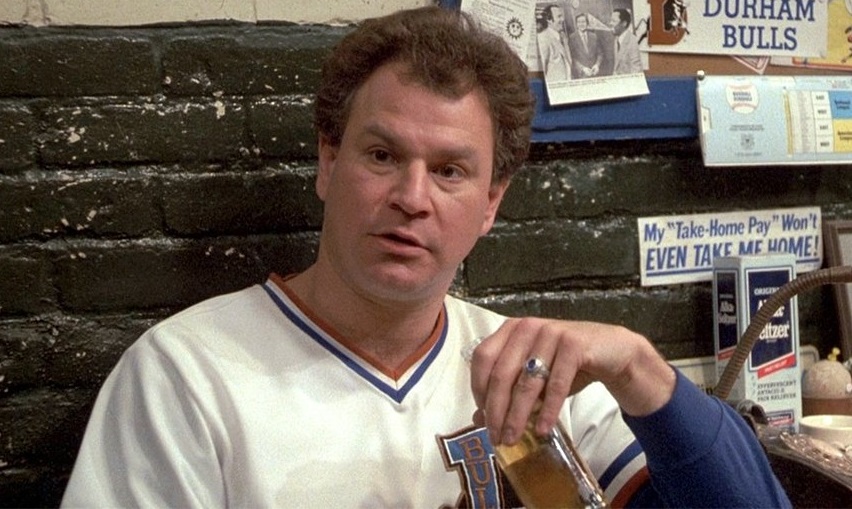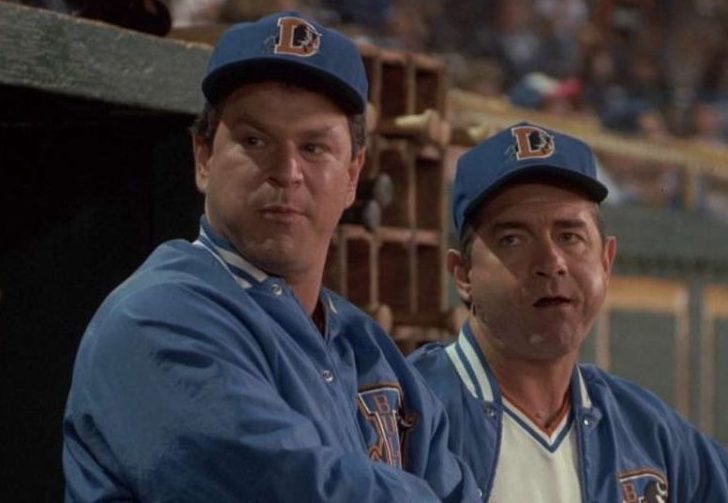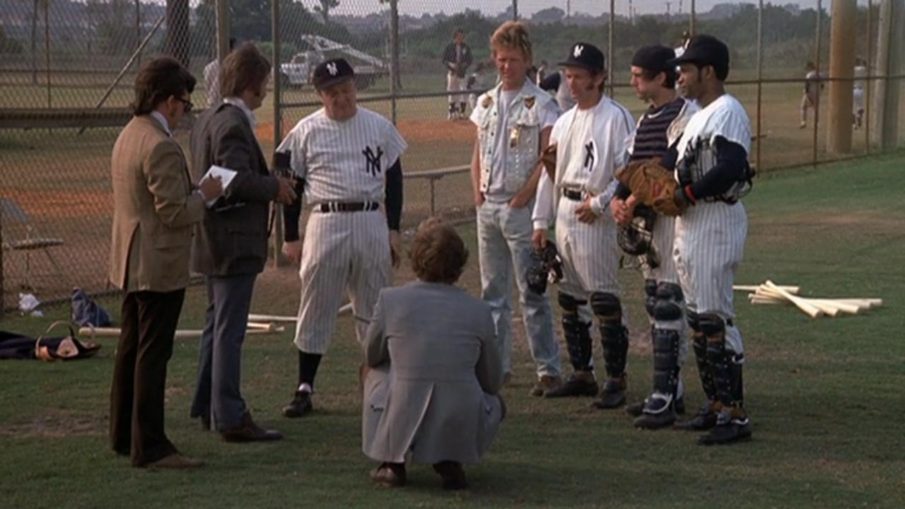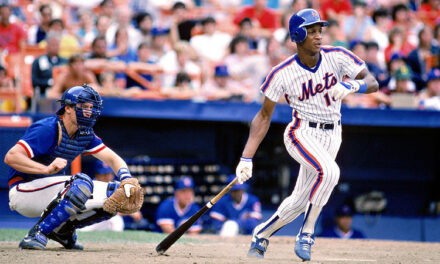
The Durham Bulls were dealing with a lot of shit.
Prized pitching prospect Nuke LaLoosh was struggling with his command, dealing with jammed eyelids and his father was watching in the stands.
The first baseman’s glove was cursed thanks to his girlfriend.
And no one on the team knew what to get Jimmy and Millie for a wedding present.
Fortunately for the Bulls, pitching coach Larry Hockett was there to offer his sage advice on at least one of the conundrums the team was facing.
“Okay, well, uh… candlesticks always make a nice gift, and uh, maybe you could find out where she’s registered and maybe a place-setting or maybe a silverware pattern. Okay, let’s get two! Go get ’em.”
While the above scenario is one of fiction, most baseball and film fans will no doubt remember this specific interaction verbatim. The two and a half minute meeting on the mound scene from one of the greatest baseball films of all-time, Bull Durham, is a favorite and iconic one for most.
The beauty of this scene is that even though the players are dealing with a multitude of issues, Hockett is able to break the tension by offering his wedding gift suggestion, while simultaneously shifting back into classic baseball cliché by telling his players, “Okay, let’s get two!”
The indelible, ad-libbed candlesticks line celebrates its thirtieth anniversary this year, as the film was released in theaters on June 15, 1988. Actor, comedian and writer Robert Wuhl landed the part of “yes-man” pitching coach Larry Hockett, even after a rocky audition.
As Wuhl explains it, director Ron Shelton told him it was the single worst audition he had ever seen, however, he hired him immediately. Wuhl’s portrayal of Hockett brought color and comic relief to the life of the minor leagues, helping him land the role.
The veteran actor has amassed quite the career, working as a joke writer for the late, great Rodney Dangerfield, appearing in such films as Good Morning Vietnam, Batman, and Cobb, and created, co-executive produced and starred in the hit HBO comedy series, Arliss.
Though for Wuhl, Bull Durham holds a particularly special place in his heart as the Union, New Jersey native grew up and still is a big baseball fan.
I learned that firsthand.
After our interview on Bull Durham’s thirtieth anniversary concluded, we spent the next forty-minutes discussing an assortment of topics ranging from the Mets to the Yankees to analytics in baseball.
Wuhl’s portrayal of the lighthearted pitching coach is still revered and lauded by audiences for his wit and comic relief. The effervescent actor is forever grateful for the fans who continue to hold Bull Durham in such high regard, and rightly so. For it was the fan’s reaction during early focus groups that helped keep the mound visit scene in the film, as audiences voted it as either their first or second favorite part of the movie.
Fans not only continue to exalt the highest-rated baseball film of all-time per Rotten Tomatoes (97 percent), but they forever have several viable gift options to choose from when attending a wedding.
All thanks to Larry Hockett.
I had the privilege of speaking with Wuhl in early-July, where we discussed why Bull Durham is so beloved by audiences, his personal list of top baseball films, and of course, the candlesticks scene.

MMO: It’s been thirty years since Bull Durham was released in theaters. Why do you think the film did and still does resonate with fans?
Wuhl: Well, there’s a difference because it’s not just with fans. It’s a movie that people who aren’t baseball fans like.
It’s a really terrific piece of prose, a great piece of writing, and the three leads are impeccable. I just saw it again and Tim [Robbins], Susan [Sarandon] and Kevin [Costner] are just great.
MMO: I heard you say in a prior interview that you bombed your audition with director Ron Shelton. He even commented that it was the worst audition he had seen.
What happened during the audition, and ultimately, how did you land the role of Larry Hockett?
Wuhl: To get the quote completely correct, Ron said, “It was the worst audition I’ve ever seen. Hire him immediately!” That’s the quote, that’s what he said.
The character wasn’t on the page that much; I don’t think Larry Hockett has ten lines in the whole script. I had spoken to my acting guru at the time, the late, great Bruno Kirby about the character and of the pitching coach in the minor leagues.
Bruno said something so bright, he said, “It seems to me that the pitching coach’s future depends upon the manager’s future.” If the manager moves up, the pitching coach would move up, which is the way it used to be in baseball. So I realized, okay, I am pretty much his ‘yes’ man. I’m a sounding board but whatever the manager wants I’m doing. Whatever he said I just parroted.
I went into the audition and if the skipper said something I just said something, I just seconded everything. I was pretty much all over the place and also my dad had played ball so I knew all the baseball talk like hum-babe, hum-babe, no batter here. I threw everything against the kitchen sink.
MMO: The meeting on the mound when you come out and tell the players about a good wedding gift is an iconic scene. I’ve read that the original line from the script was, “Okay, I thought there was a problem.” Can you talk about where the candlesticks line came from, and the reaction you received from it?
Wuhl: A week before we started shooting I had a friend who was getting married, and I called my wife and I asked her what we were going to get them for a wedding present. She remarked, “Candlesticks always make a nice gift. Or find out where she’s registered and maybe a place-setting or silverware pattern.”
We start shooting about a week later and that scene was shot at night, and it was very cold. In a lot of scenes, you’ll see the breath on the mound, you’ll see breath coming out of people on the mound because it was that cold out.
We were on the last shot of the evening and by this time I had developed a rapport with Ron [Shelton] and he knew I was a comic and a writer. It was the last shot so we shot the scene as written and I said, ‘I thought there was a problem.’ Then Ron said, “Okay, it’s the last shot. Robert, say whatever you want to say now.”
The setup remained completely the same which was Nuke’s father was in the stands, the first baseman’s girlfriend put a curse on his glove, and we don’t know what to get Millie and Jimmy for a wedding present, we’re dealing with a lot of shit. And I said, ‘Well, candlesticks always make a nice gift, or find out where she’s registered and maybe a place-setting or maybe a silverware pattern. Okay, let’s get two.’ Which is the key to the whole thing because he’s back into cliché baseball.
We shot it and the brilliance of it was watching everyone’s reaction because they don’t react, nobody cracks up and Kevin and Tim are brilliant in it.
The next night we would watch the previous day’s dailies. It comes up as the last scene of the dailies and you’ve got to remember a lot of the cast and crew weren’t there to see it because it was the last shot and everyone had gone home. Everybody broke up [laughing], and I thought, Well, that’s great, but I’m never going to see this again.
Ron invites me to one of the first previews and it’s in the movie, and the whole place cracks up. I was shocked because I know a lot of directors who would have said, yes, that was funny. Yes it was in character and it works, but I didn’t write it and it’s not staying in my movie.
Ron was the complete opposite, Ron welcomed improvisation. The movies I succeeded in are with people like Ron Shelton, Barry Levinson and Tim Burton; they ask for input.
The most important thing about that is the studio wanted the entire scene cut, from the start of Nuke throwing and his dad in the stands. They said the scene didn’t move the plot. Ron said, “What plot? There is no plot in this movie. It’s about a bunch of people, this is the plot. This is what they talk about.’
They said it doesn’t move the story, you’ve got to move the story. And the only reason that scene stayed in the movie is because after these previews they have focus groups and you fill out these questionnaires and they ask what is your favorite scene in the movie. It was always, always, number one or number two; that’s the only reason it stayed in the movie.
MMO: Was there a lot of creative room for improv or ad-lib during the shoot?
Wuhl: I’d say it’s 95 percent script. When I hear this improv thing, most improv sucks. [Laughs.] I’ve got to tell you. This happened to be a button on a joke and the scene worked.
I’ll give you an example: The famous When Harry Met Sally orgasm scene. That scene works. Billy [Crystal] on the spot, after shooting, came up with the line and cut to Rob Reiner’s mom saying, “I’ll have what she’s having.”
That was not written, it’s a button. That’s not improvising a scene; that’s work and that’s writing. A button, you came up with a better tag, that’s all. I came up with a tag that worked, the scene was brilliant.
MMO: So when you show up to weddings are couples upset if you don’t bring candlesticks or a place setting?
Wuhl: I never have to think about a wedding gift, that’s for sure.
MMO: Do you have a favorite line or scene from the film?
Wuhl: Candlesticks only because it became so popular. I just saw it again and one that jumps out on me was when I said, “Looks like a convention out there, pretty soon they’re going to call the role.” That was probably too smart for Larry Hockett to say. When I think about it I say that’s probably too hip a line for this guy to say but people surprise you.
MMO: Was the convention line in the script?
Wuhl: No, that was an ad-lib. I didn’t have many lines in the movie.
MMO: But you have the iconic lines in the film, like the lollygaggers scene.
Wuhl: Lollygaggers is in the script except it was broken up. I think it was all given to skip and he and I broke it up because he and I became very good friends and would hang out a lot together. When we would do stuff we became a comedy team.
I’m not sure I had the punch line of lollygaggers, I seem to remember that I didn’t. He gave that to me but that was in the script.
MMO: Kevin Costner is synonymous with baseball movies. Is he as good as advertised as an athlete?
Wuhl: Yeah he’s a good athlete, he’s a very good athlete. You’ve got to remember that he had to learn to switch-hit; he’s a natural right-handed hitter. Whereas Tim you could question his motion, you can’t question Costner from the left-hand side, he had to learn to do that.

MMO: What are some of your favorite baseball films?
Wuhl: Bang the Drum Slowly and a movie about ten years ago called Sugar are terrific movies. The reason most sports movies fail, and Ron and I share this opinion, is they’re told from the point of view of the fan. The fan only cares about one thing: Did the team win or lose?
They don’t care about anything else like how they got there. Ron said, “I don’t know what the fan was thinking, I was a ballplayer. I knew what the guy at second base was thinking, and he’s thinking I’m trying to keep my job.”
The biggest mistake is when it comes down to the big game, and Ron said, “There are no big games. In baseball you have a big game every day, it’s routine.”
In movies, it’s always the big game and if you think of it, Bull Durham, Bang the Drum Slowly and Sugar don’t come down to the big game. None of them do. Eight Men Out doesn’t come down to the big game, it’s about something they did but it doesn’t come down to is the team going to win or lose. Even Pride of the Yankees, as hokey as it is, doesn’t come down the big game; it’s a good Hollywood movie.
The original Bad News Bears, which I think is an underrated movie, has a big game but they lose. They come back and they play but they lose, but that’s not the point. The best sports movies don’t come down to the big game, I don’t think.
Field of Dreams has no big game but I’ve got a problem with that film, I’ve got a problem with one part of it. When James Earl Jones comes to give his big speech at the end and he goes into, “Ray, baseball reminds us of all that was once good about America.” And I say, ‘Wait a minute, good about America? You couldn’t play until 1947! Every one of those Field of Dreams players is white coming out of there.’ Nobody ever picks up on this! I’ve got friends who are smart people and they go, “Wow, I never thought of that.” And I go, ‘Well, you know, I did.’
That throws me out of the movie a little with that scene. It’s good about fathers and sons, that’s what it’s about. It’s nice and everything, but that scene goes a little far, especially coming from James Earl Jones. In the book, it was J.D. Salinger as the character, it’s not Terrence Mann. But of course, J.D. Salinger wasn’t going to get permission, so they made up someone else.
Everybody loves The Natural, but it’s very different from the book. Even though that comes down to a big game, in the book he fails. My problem with The Natural is on a different level. You’re going to have the home run? Okay, it’s rah-rah, it’s a Hollywood movie. My problem with The Natural is he’s a young, single guy who picks up a girl and they go up to the room and they have sex, I suppose. She shoots him and jumps out of the window, why is he hiding for twenty years? What did he do? It’s like, wait a minute, I’m missing a big part in this that is taking me emotionally out of this movie. He did nothing wrong, why is he hiding? What’s the big deal if he is discovered? Who cares?
He strikes out in the book but hits the home run in the film. If you think about baseball, everything is built upon failure, most of it. If you fail seven out of ten times you’re hitting .300. The three most important pieces of literature I would argue about baseball are Casey at the Bat, Take Me Out to the Ballgame and The Natural. And all end in failure. The Mighty Case has struck out, one, two, three strikes you’re out, and the guys strikes out [in The Natural]. Baseball embraces that more than anything else because it was a longer narrative; the season is a much longer narrative. It’s like a great novel.
If you go to a younger generation they’ll say Moneyball. Moneyball’s a good movie, it’s wrong, it’s total bullshit. That movie would have you believe, and so would that book for that matter, that the Oakland A’s won because of Ricardo Rincon and Scott Hatteberg.
MMO: While totally discounting Barry Zito, Mark Mulder and Tim Hudson.
Wuhl: Yeah, yeah! It’s like, Atlanta won because of Mark Lemke and Otis Nixon and leaving out [Greg] Maddux, [John] Smoltz, and [Tom] Glavine.
That’s what Moneyball did, they never mention those three guys. It’s a good movie and Aaron Sorkin is one of our greatest writers and they have some really good scenes in there. It’s also very long, it’s about two hours and twenty minutes.
MMO: I know you’re a big baseball fan. I’m curious, what’s your take on the Mets this season, and what they need to do to improve moving forward?
Wuhl: I personally am a big believer that the fish stinks from the head down; I think they have a problem at the top. Unless you have a guy who is the greatest brain trust around you, which he does not have, and he allows them to do their job, which he does not do, with the exception of Sandy [Alderson].
You talk about a narrative? They give off this narrative of how [Bernie] Madoff has crippled this team. What year is Madoff already? How many years are you going to blame Madoff? You’re in the biggest market in the country, don’t tell me that your payroll can’t be $200 million.
Baseball teams are a monopoly. For what you bought it for, let’s say you sign Manny Machado to a ten-year deal – which I would not do. Let’s say you pay him $30 million a year, your team value when you go to sell this team or you can borrow against has gone up to $2 billion! Each year it’s going to go up another five percent, so that’s $100 million more per year and you’re making money. So you’re going to tell me that the $30 million is going to break your bankroll? Don’t hand me that shit.
MMO: I can’t thank you enough for some time today, Robert. It was great to reminisce about one of the greatest baseball films of all time with you.
Wuhl: My pleasure. Thank you.
Follow Robert Wuhl on Twitter, @RobertWuhl















